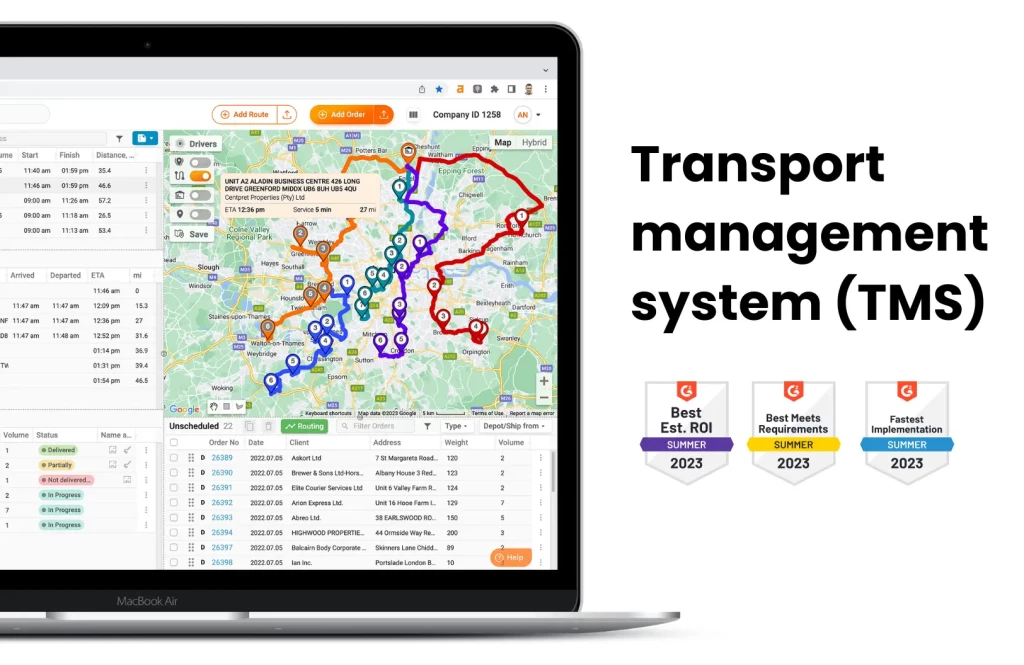The Importance of Logistics Management Solutions in Supply Chains
Logistics management software is a critical component in optimizing supply chains, enabling businesses to improve efficiency, reduce costs, and enhance customer satisfaction. With enhanced visibility and automation, these solutions facilitate timely deliveries, accurate inventory management, and streamlined operations. As globalization increases the complexity of supply chains, the right software can be a game-changer, allowing companies to meet customer demands while minimizing waste and maximizing productivity.
Technological Advancements Shaping Logistics Management
The logistics industry is undergoing a transformation powered by technological advancements. Innovations such as Artificial Intelligence (AI) enable predictive analytics, optimizing inventory and route planning. The Internet of Things (IoT) provides real-time tracking of shipments and devices, offering unprecedented visibility into operations. Moreover, blockchain technology enhances transparency across supply chains by securely logging transactions, reducing fraud, and improving traceability. As these technologies evolve, they reshape the logistics landscape, driving greater efficiency and security.
Key Trends Influencing 2025
As we look towards 2025, several key trends are anticipated to influence logistics management software. The demand for automation is on the rise, reducing manual interventions and streamlining processes. Sustainability is also becoming a focal point, with organizations striving to minimize their environmental footprint through efficient routing and resource management. Lastly, the integration of AI technologies into logistics solutions will enhance decision-making capabilities, enabling businesses to operate more intelligently in a fast-paced market.
Criteria for Selecting Logistics management tool
Defining Evaluation Metrics
Choosing the right logistics management software involves careful evaluation based on several criteria. Organizations should assess their unique needs and operational challenges to define metrics that matter most to their specific supply chain requirements.
User-Friendliness
User-friendliness is crucial in ensuring that all staff, regardless of their technical expertise, can efficiently navigate the software. A clear and intuitive interface reduces the learning curve, minimizes errors, and enhances overall productivity.
Customization Options
Every business has unique processes. The ideal logistics management software should offer customization options that allow organizations to tailor functionalities, dashboards, and workflows to align with their specific operations and objectives.
Scalability
As businesses grow, so do their logistics needs. Scalable solutions can adjust to fluctuations in demand, accommodating increased volumes without sacrificing performance or requiring extensive overhauls.
Integration Capabilities
The effectiveness of logistics management software is often dependent on its ability to integrate with existing enterprise systems, such as ERP and CRM tools. Compatibility ensures seamless data flow and improved operational coherence.
Real-Time Tracking and Reporting
Real-time tracking capabilities provide visibility into shipments, inventory levels, and operational performance. Robust reporting tools enable data-driven decision-making, allowing logistics managers to monitor Key Performance Indicators (KPIs) effectively.
Cost-Efficiency
Ultimately, the decision to invest in logistics software should come down to enhanced cost efficiency. Assessing the ROI, including potential savings from optimized operations and improved service delivery, is essential when evaluating options.
Customer Support and Service
Reliable customer support and training are critical factors. The software provider should offer comprehensive support, resources, and training to facilitate smooth implementation and ongoing user engagement.
The Top 15 Best Logistics Management Software Solutions
1. SAP Integrated Business Planning
- Overview: A robust solution focusing on inventory and supply chain optimization with advanced forecasting capabilities.
- Key Features: Demand planning, supply chain analytics, and integrated financial planning.
- Pros and Cons: Pros – Comprehensive functionality for large enterprises; Cons – High cost and complexity in implementation.
- Who It’s Best For: Large organizations needing advanced analytics and planning.
2. Oracle Transportation Management
- Overview: Optimizes transportation operations by streamlining processes and reducing costs.
- Key Features: Freight payment, route optimization, and shipment tracking.
- Pros and Cons: Pros – Strong analytical tools; Cons – User interface could be improved.
- Who It’s Best For: Companies with complex transportation needs.
3. Cerasis
- Overview: Provides freight and logistics management solutions focused on freight audit and transportation optimization.
- Key Features: Transportation management system (TMS), claims management, and data analytics.
- Pros and Cons: Pros – Excellent customer service; Cons – Limited integration options.
- Who It’s Best For: Mid-sized businesses looking for freight management.
4. ShipBob
- Overview: A tech-enabled 3PL that offers logistics solutions for e-commerce businesses.
- Key Features: Inventory management, order fulfillment, and shipping automation.
- Pros and Cons: Pros – User-friendly platform; Cons – Limited scalability for larger businesses.
- Who It’s Best For: Small to mid-sized e-commerce businesses.
5. Freightos
- Overview: Offers a cloud-based platform for international freight shipping with transparent pricing.
- Key Features: Instant quotes, booking, and analytics.
- Pros and Cons: Pros – Simplifies cross-border shipping; Cons – Limited to freight forwarders.
- Who It’s Best For: Businesses engaged in international trade.
6. Transplace
- Overview: A transportation management platform integrating supply chain visibility and analytics.
- Key Features: Shipment tracking, freight optimization, and reporting tools.
- Pros and Cons: Pros – Comprehensive visibility; Cons – Implementation can be time-consuming.
- Who It’s Best For: Enterprises with extensive logistics operations.
7. Sage 100cloud
- Overview: An ERP solution with strong logistics management functionalities, particularly for small businesses.
- Key Features: Inventory management, order processing, and shipping integrations.
- Pros and Cons: Pros – Affordable and straightforward; Cons – Lacks advanced features for larger businesses.
- Who It’s Best For: Small to medium manufacturers and distributors.
8. WMS by Fishbowl
- Overview: A warehouse management system that integrates well with popular e-commerce platforms.
- Key Features: Inventory control, order tracking, and shipping management.
- Pros and Cons: Pros – Great for e-commerce; Cons – Limited usability for larger warehouses.
- Who It’s Best For: Online retailers.
9. Infor CloudSuite Supply Management
- Overview: An end-to-end supply chain solution with integrated logistics capabilities.
- Key Features: Planning, sourcing, and procurement tools.
- Pros and Cons: Pros – Highly customizable; Cons – Extensive training required.
- Who It’s Best For: Enterprises looking for comprehensive solutions.
10. Logiwa
- Overview: Designed for e-commerce and 3PL businesses focusing on order and inventory management.
- Key Features: Multi-channel selling, inventory tracking, and shipment automation.
- Pros and Cons: Pros – Excellent integration capabilities; Cons – May require custom setup.
- Who It’s Best For: E-commerce businesses and fulfillment providers.
11. Manhattan Associates TMS
- Overview: A top-of-the-line transportation management system focused on data analytics and optimization.
- Key Features: Route optimization, freight audit, and performance analytics.
- Pros and Cons: Pros – High level of customization; Cons – Cost can be a barrier for SMEs.
- Who It’s Best For: Large organizations needing advanced transportation management.
12. Kuebix TMS
- Overview: A flexible transportation management solution that caters to shippers of all sizes.
- Key Features: Rate shopping, load optimization, and real-time tracking.
- Pros and Cons: Pros – User-friendly and intuitive; Cons – Limited support during peak times.
- Who It’s Best For: Businesses of all sizes looking for a versatile TMS.
13. ShipStation
- Overview: A robust shipping solution for ecommerce businesses, perfect for managing shipping needs.
- Key Features: Label generation, tracking, and returns management.
- Pros and Cons: Pros – Broad marketplace integrations; Cons – Limited features for non-ecommerce businesses.
- Who It’s Best For: E-commerce stores looking for streamlined shipping processes.
14. Flexport
- Overview: A digital freight forwarder that simplifies global trade through an online platform.
- Key Features: Visibility into shipments, analytics, and collaboration tools.
- Pros and Cons: Pros – Transparency in pricing and processes; Cons – Limited support in certain regions.
- Who It’s Best For: Businesses with global shipping needs.
15. Blue Yonder
- Overview: A supply chain solution that uses AI to enhance logistics and inventory management.
- Key Features: Demand forecasting and inventory optimization tools.
- Pros and Cons: Pros – Powerful analytics; Cons – Implementation can be complex.
- Who It’s Best For: Businesses that prioritize advanced analytics in their logistics strategy.
Conclusion
Selecting the right logistics management software is paramount for optimizing supply chain operations and meeting the demands of an evolving market landscape. However, this process can present challenges, including aligning with business goals, ensuring user adoption, and managing integration complexities. Therefore, businesses should thoroughly assess their unique requirements and weigh the features and benefits of each solution. By doing so, organizations can transform their logistics capabilities and achieve greater operational efficiency.
FAQs
What is logistics management software?
Logistics management software helps businesses plan, execute, and monitor the movement of goods and services, facilitating coordination across all parts of the supply chain.
How does logistics software improve efficiency?
Logistics software enhances efficiency through process automation, real-time tracking, and improved communication, enabling businesses to reduce errors, cut costs, and elevate customer satisfaction.
What features should I look for in logistics management software?
Key features include user-friendliness, customization, scalability, integration capabilities, real-time tracking and reporting, cost-efficiency, and customer support services.
Is cloud-based logistics software better than on-premise solutions?
Cloud-based solutions offer accessibility, scalability, and lower upfront costs, while on-premise solutions might provide more control but can require significant investments in infrastructure. The best choice depends on a business’s specific needs and IT capabilities.
How can logistics software support sustainability goals?
Logistics software can track fuel usage, optimize routes to reduce emissions, and manage inventory more efficiently, thereby minimizing waste and contributing to overall sustainability goals.
Are there free logistics management software options available?
Yes, some free options exist, often with limited features. Paid solutions generally offer more robust functionalities and support, providing better value for growing businesses.
How often should we evaluate our logistics software?
Regular assessments, ideally annually or biannually, help ensure that the software continues to meet evolving business needs and adapts to industry changes.
What industries benefit most from software for logistics management?
Industries such as retail, manufacturing, e-commerce, and food distribution significantly benefit from logistics management software, as it helps streamline operations, enhance visibility, and improve customer service.



